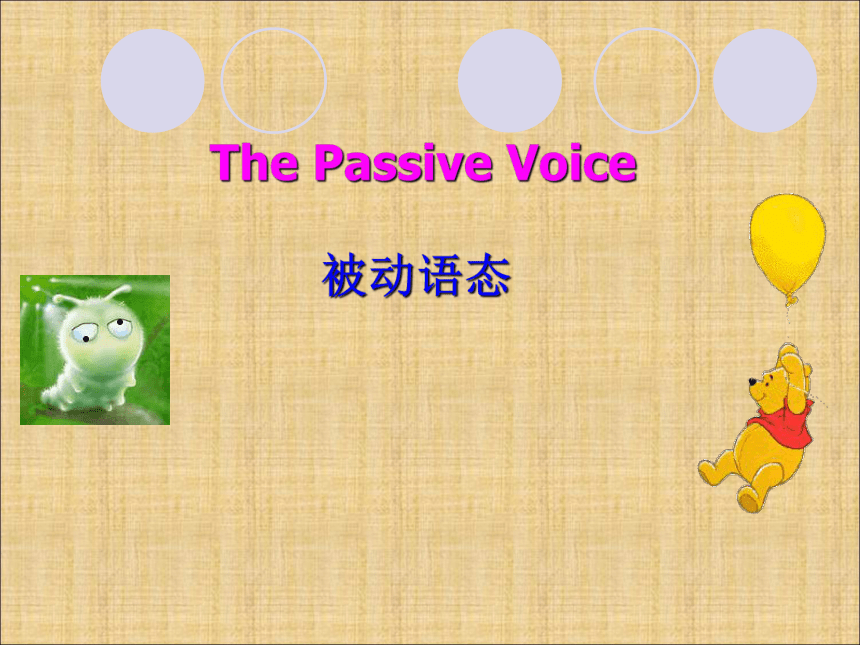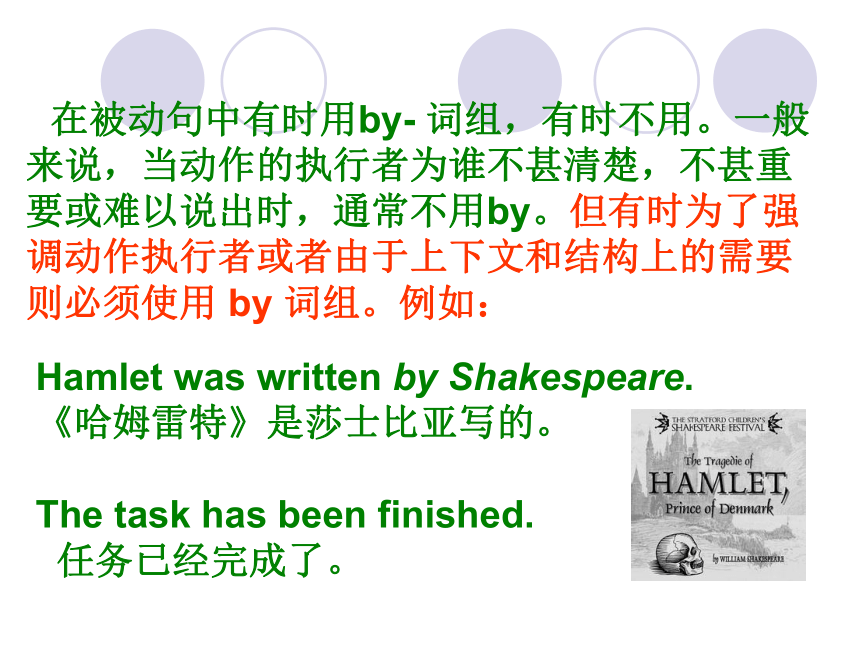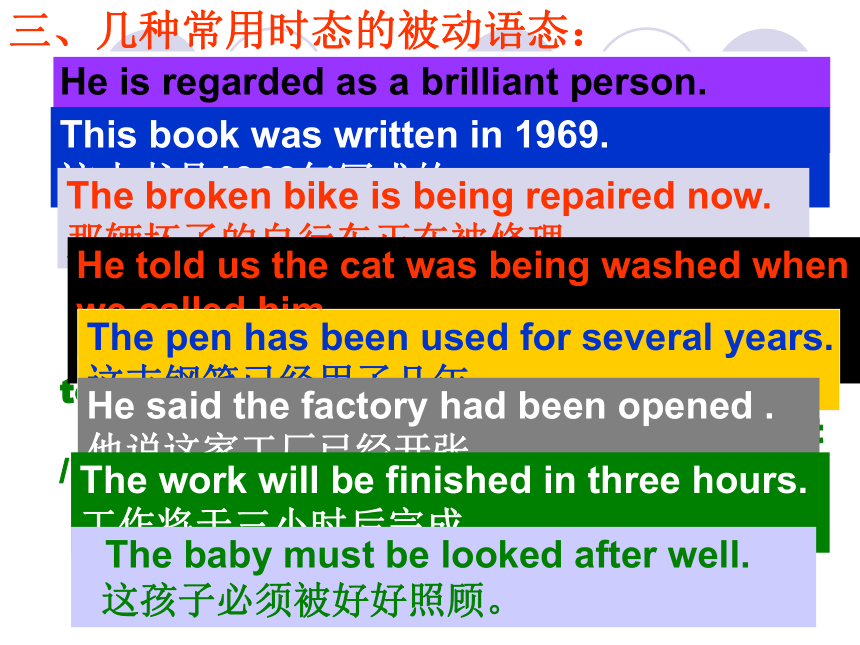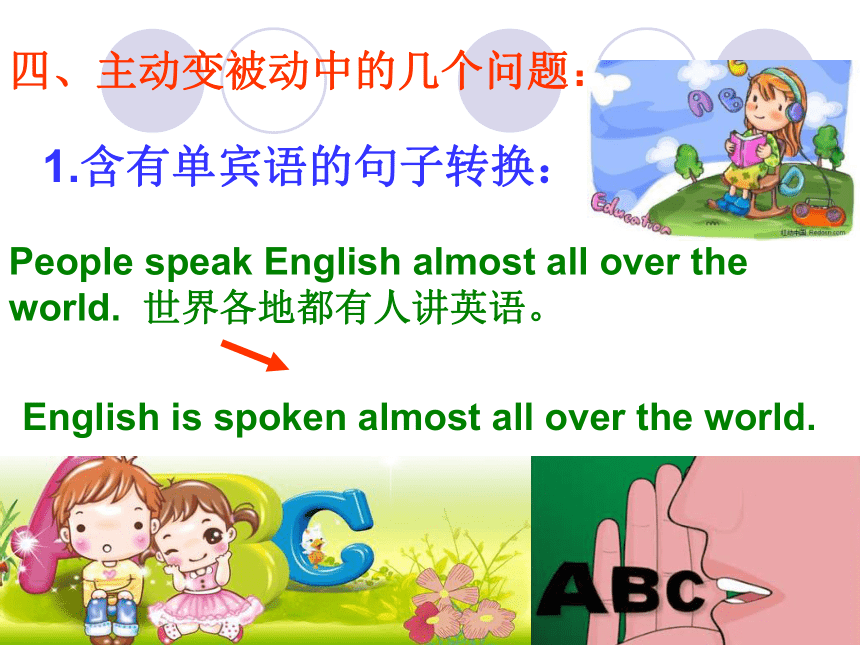人教新课标必修2 Unit3 Comuters Learning about language 课件(18张PPT)
文档属性
| 名称 | 人教新课标必修2 Unit3 Comuters Learning about language 课件(18张PPT) |  | |
| 格式 | zip | ||
| 文件大小 | 815.2KB | ||
| 资源类型 | 教案 | ||
| 版本资源 | 人教版(新课程标准) | ||
| 科目 | 英语 | ||
| 更新时间 | 2020-02-13 20:32:18 | ||
图片预览







文档简介
课件18张PPT。 The Passive Voice
被动语态
语态(voice)是个语法范畴,它是一种动词形式,表示动词的主语与该动词所表示的动作之间的主动和被动关系。当主语是动作的执行者时,动词用主动语态(Active Voice);如果主语是动作的承受者,动词便用被动语态(Passive Voice)。 We cleaned the classroom yesterday. 昨天我们打扫了教室。
The classroom was cleaned by us yesterday. 昨天教室被我们打扫了。一、被动语态的定义:动词的被动语态由“助动词be+及物动词的 过去分词”构成。当主动句变为被动句时,原来的宾语变成了主语,原来的主语变成了介词by 的宾语。主动句与被动句的结构虽然不同,但动作的执行者和承受者的关系并没有改变。二、被动语态的一般结构:即:be+ done (+ by)在被动句中有时用by- 词组,有时不用。一般来说,当动作的执行者为谁不甚清楚,不甚重要或难以说出时,通常不用by。但有时为了强调动作执行者或者由于上下文和结构上的需要则必须使用 by 词组。例如:Hamlet was written by Shakespeare. 《哈姆雷特》是莎士比亚写的。
The task has been finished.
任务已经完成了。一般现在时: am / is / are done
一般过去时: was / were done
现在进行时: am / is / are being done
过去进行时: was / were being done
现在完成时: have / has been done
过去完成时: had been done
一般将来时: shall / will be done ; be going to be done
当句中含有情态动词时,句子结构为 can / must / have to…be doneHe is regarded as a brilliant person. 他被认为很有才气。This book was written in 1969. 这本书是1969年写成的。The broken bike is being repaired now. 那辆坏了的自行车正在被修理。He told us the cat was being washed when we called him. 他告诉我们打电话时他正在给猫洗澡。The pen has been used for several years. 这支钢笔已经用了几年。He said the factory had been opened . 他说这家工厂已经开张。The work will be finished in three hours. 工作将于三小时后完成。The baby must be looked after well. 这孩子必须被好好照顾。三、几种常用时态的被动语态:
People speak English almost all over the world. 世界各地都有人讲英语。English is spoken almost all over the world.1.含有单宾语的句子转换:四、主动变被动中的几个问题:People believe that he is an honest boy. 大家认为他是个诚实的孩子。 It is believed that he is an honest boy.The boy is believed to be an honest one.1)用先行的it作形式主语,把宾语从句变成后置的主语从句。练习:We think that we could win the game. we are thought to win the game.It is thought that we could win the game.2)把宾语从句里的主语变成被动句的主语,同时把宾语从句中的谓语变成不定式短语。当主动句的宾语是that引导的宾语从句,可转换为两种形式的被动句。2.含有双宾语的主动句的转换I gave the book to Mr. Smith yesterday. 昨天我给了史密斯先生一本书。The book was given to Mr. Smith yesterday ( by me).Mr. Smith was given a book yesterday (by me). His mother gave him a present for his birthday. He was given a present by his mother for his birthday.3. 含有动词短语的句子转换。They have never listened to him. 人家从不听他的话。He has never been listened to.练习:
They take good care of the baby.The baby is taken good care of by them.注意:含动词词组的被动语态,须将其看作一 个整体,不可把它们分隔开来。He made me do the work.I was made to do the work by him.4. 主动句中动词不带to, 但在被动句
中带to:练习:
we heard him say good-bye to his friends.He was heard to say good-bye to his friends.注意:make, hear, see, watch等词
在主动句中动词不带to, 但在被动句中要带to。这些动词真奇怪,主动句中to 离开,被动句中to回 来。五、“get+P.P. ”表示被动
The naughty boy got off the bike and got injured.
这个调皮的男孩从自行车上
掉下来受伤了。
My watch got broken while I was playing with the children.
我跟孩子们玩的时候把手表弄坏了。
六、介词短语表示被动意义 介词in, on under等+n.构成介词短语表示被动, in print/use, on show/sale, under control/ under treatment/ repair/ construction/ discussion。
1. 大楼正在建设中。
2. 这本小说正在印刷。
3.这件艺术品正在展出。
1. The building is under construction.
2. This novel is in print.
3. This artwork is on show.七、主动形式也可以表示被动意义的几种情况: 1、主语是物,谓语是表示主语特征或属性的动词。常见的这类动词有write, read, wear, wash, clean, sell, cut,run,dry等,这些动词常与副词well,easily,quickly,smoothly等连用。例如: This pen writes quite smoothly.
This kind of book sells well.
The coat dries easily. 2、表示主语状态特征的连系动词:look, feel, smell, taste, sound, prove, appear,remain,keep,stay,become,turn,grow,turn out,prove等。
例如: Your idea sounds reasonable.
What he said proved to be correct.
The water feels cold.
The soup tastes delicious.3、 be worth ,want,need,require后接动名词的主动式表示被动意义:be worth doing, deserve /
need / want / require doing (to be done)结构中
His suggestion is not worth considering.
The house needs repairing(to be repaired).
The flowers want watering(to be watered).
进行时表被动:
The book is printing.
The meat is cooking.
Our new teaching building is building. The door won't shutopen.
The radio won't play.
(本身固有的特性)
The radio doesn't play.
(暂时的状况)
4、 当open, close, shut, lock, move等用做不及物动词且表示主语的某种属性时,通常用主动形式表示被动意义。他们常与can’t, won’t等连用。5、不定式的主动形式表被动:
HIV is difficult to cure.
The question is easy to answer.
The man has a large family
to support.
They have a lot of work to do.
I found the guy difficult to get along with.Translation:
1. 这本书已被翻译成许多种语言。
This book has been translated into many languages.2. 我们家乡将建一条新铁路。
A new railway will be built in our hometown.3. 我们学校明年将种更多的树。
Many more trees will be planted in our school next year.
被动语态
语态(voice)是个语法范畴,它是一种动词形式,表示动词的主语与该动词所表示的动作之间的主动和被动关系。当主语是动作的执行者时,动词用主动语态(Active Voice);如果主语是动作的承受者,动词便用被动语态(Passive Voice)。 We cleaned the classroom yesterday. 昨天我们打扫了教室。
The classroom was cleaned by us yesterday. 昨天教室被我们打扫了。一、被动语态的定义:动词的被动语态由“助动词be+及物动词的 过去分词”构成。当主动句变为被动句时,原来的宾语变成了主语,原来的主语变成了介词by 的宾语。主动句与被动句的结构虽然不同,但动作的执行者和承受者的关系并没有改变。二、被动语态的一般结构:即:be+ done (+ by)在被动句中有时用by- 词组,有时不用。一般来说,当动作的执行者为谁不甚清楚,不甚重要或难以说出时,通常不用by。但有时为了强调动作执行者或者由于上下文和结构上的需要则必须使用 by 词组。例如:Hamlet was written by Shakespeare. 《哈姆雷特》是莎士比亚写的。
The task has been finished.
任务已经完成了。一般现在时: am / is / are done
一般过去时: was / were done
现在进行时: am / is / are being done
过去进行时: was / were being done
现在完成时: have / has been done
过去完成时: had been done
一般将来时: shall / will be done ; be going to be done
当句中含有情态动词时,句子结构为 can / must / have to…be doneHe is regarded as a brilliant person. 他被认为很有才气。This book was written in 1969. 这本书是1969年写成的。The broken bike is being repaired now. 那辆坏了的自行车正在被修理。He told us the cat was being washed when we called him. 他告诉我们打电话时他正在给猫洗澡。The pen has been used for several years. 这支钢笔已经用了几年。He said the factory had been opened . 他说这家工厂已经开张。The work will be finished in three hours. 工作将于三小时后完成。The baby must be looked after well. 这孩子必须被好好照顾。三、几种常用时态的被动语态:
People speak English almost all over the world. 世界各地都有人讲英语。English is spoken almost all over the world.1.含有单宾语的句子转换:四、主动变被动中的几个问题:People believe that he is an honest boy. 大家认为他是个诚实的孩子。 It is believed that he is an honest boy.The boy is believed to be an honest one.1)用先行的it作形式主语,把宾语从句变成后置的主语从句。练习:We think that we could win the game. we are thought to win the game.It is thought that we could win the game.2)把宾语从句里的主语变成被动句的主语,同时把宾语从句中的谓语变成不定式短语。当主动句的宾语是that引导的宾语从句,可转换为两种形式的被动句。2.含有双宾语的主动句的转换I gave the book to Mr. Smith yesterday. 昨天我给了史密斯先生一本书。The book was given to Mr. Smith yesterday ( by me).Mr. Smith was given a book yesterday (by me). His mother gave him a present for his birthday. He was given a present by his mother for his birthday.3. 含有动词短语的句子转换。They have never listened to him. 人家从不听他的话。He has never been listened to.练习:
They take good care of the baby.The baby is taken good care of by them.注意:含动词词组的被动语态,须将其看作一 个整体,不可把它们分隔开来。He made me do the work.I was made to do the work by him.4. 主动句中动词不带to, 但在被动句
中带to:练习:
we heard him say good-bye to his friends.He was heard to say good-bye to his friends.注意:make, hear, see, watch等词
在主动句中动词不带to, 但在被动句中要带to。这些动词真奇怪,主动句中to 离开,被动句中to回 来。五、“get+P.P. ”表示被动
The naughty boy got off the bike and got injured.
这个调皮的男孩从自行车上
掉下来受伤了。
My watch got broken while I was playing with the children.
我跟孩子们玩的时候把手表弄坏了。
六、介词短语表示被动意义 介词in, on under等+n.构成介词短语表示被动, in print/use, on show/sale, under control/ under treatment/ repair/ construction/ discussion。
1. 大楼正在建设中。
2. 这本小说正在印刷。
3.这件艺术品正在展出。
1. The building is under construction.
2. This novel is in print.
3. This artwork is on show.七、主动形式也可以表示被动意义的几种情况: 1、主语是物,谓语是表示主语特征或属性的动词。常见的这类动词有write, read, wear, wash, clean, sell, cut,run,dry等,这些动词常与副词well,easily,quickly,smoothly等连用。例如: This pen writes quite smoothly.
This kind of book sells well.
The coat dries easily. 2、表示主语状态特征的连系动词:look, feel, smell, taste, sound, prove, appear,remain,keep,stay,become,turn,grow,turn out,prove等。
例如: Your idea sounds reasonable.
What he said proved to be correct.
The water feels cold.
The soup tastes delicious.3、 be worth ,want,need,require后接动名词的主动式表示被动意义:be worth doing, deserve /
need / want / require doing (to be done)结构中
His suggestion is not worth considering.
The house needs repairing(to be repaired).
The flowers want watering(to be watered).
进行时表被动:
The book is printing.
The meat is cooking.
Our new teaching building is building. The door won't shutopen.
The radio won't play.
(本身固有的特性)
The radio doesn't play.
(暂时的状况)
4、 当open, close, shut, lock, move等用做不及物动词且表示主语的某种属性时,通常用主动形式表示被动意义。他们常与can’t, won’t等连用。5、不定式的主动形式表被动:
HIV is difficult to cure.
The question is easy to answer.
The man has a large family
to support.
They have a lot of work to do.
I found the guy difficult to get along with.Translation:
1. 这本书已被翻译成许多种语言。
This book has been translated into many languages.2. 我们家乡将建一条新铁路。
A new railway will be built in our hometown.3. 我们学校明年将种更多的树。
Many more trees will be planted in our school next year.
